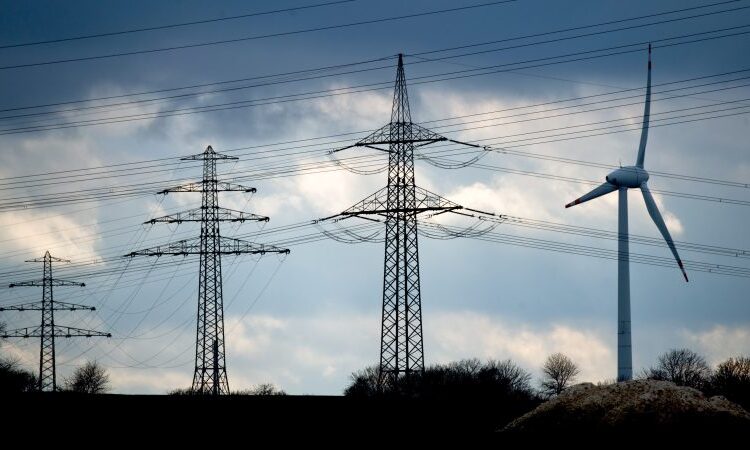
Talks on Germany’s future electricity market are heating up as all parties await a key analysis from grid operators amid looming threats from Brussels to split up the country’s wholesale market bidding zone.
Currently, all Germans pay the same price for electricity, whether they live in the wind-powered north or the coal-dependent industrial south.
But pressure for change is building up. While France also applies a single electricity tariff to household consumers, other large European countries like Italy or Sweden price electricity depending on location.
Smaller electricity pricing zones are considered more efficient economically because they reflect local conditions, such as the availability of power generation capacity or grid infrastructure.
For instance, Germany’s energy-hungry Bavaria, which is historically opposed to wind farms and high-voltage power lines on its territory, is reliant on wind power transmitted from the country’s north. This causes grid congestion and transfer losses, the cost of which is borne by all German electricity consumers.
Germany’s position at the centre of Europe has also prompted scrutiny at the EU level as the country’s undersized grid creates tensions with neighbouring EU member states.
Indeed, massive electricity demand in the South of Germany has led to “loop flows” through Poland, as German transmission capacity is insufficient to match demand. As a knock-on effect, this also impeded Poland’s ability to transmit electricity into, say, Czechia.
The EU’s energy regulatory agency, ACER, tried challenging the political consensus last year when it suggested splitting Germany’s wholesale market into multiple bidding zones.
North vs South
Following the ACER proposal, the north of Germany – where much of the country’s wind power is installed – launched an offensive to split the German electricity market.
“If I live or produce where the energy is also produced or landed, this energy must also be cheaper there,” said Norbert Lies, the energy minister of Lower Saxony, a state in northwest Germany bordering the North Sea.
Lies was backed by his colleague Reinhard Meyer from Mecklenburg-Vorpommern, a smaller northern state. “The level of electricity grid fees burdens end consumers and disadvantages northern Germany as a business location,” he noted.
Both hail from the Social Democratic Party (SPD) of Chancellor Olaf Scholz, who is himself from the northern city of Hamburg.
Southern German states ganged up in response by issuing a joint statement insisting that a uniform electricity price zone is “a central expression of the unified German economic area”. The statement was signed by Bavaria, Baden-Württemberg, Hesse, Saarland, Rhineland-Palatinate, and North Rhine-Westphalia.
Together, the southern states argue that larger markets with wider bidding zones improve market liquidity and are thus more efficient. Bavaria frequently cites the €9 billion it contributes annually to other, less well-off states, too.
No agreement in Berlin
In Berlin, Vice-Chancellor Robert Habeck, whose economy and climate action ministry is in charge of energy issues, has shown little appetite to step into the ring.
Habeck “has already emphasised several times that creating a new bidding zone is not a priority for him at the moment, so we are not holding a debate on a bidding zone split,” stressed the ministry.
Habeck’s Green party is divided on the matter while the SPD declined EURACTIV’s invitation to comment.
The business-friendly FDP, meanwhile, is in favour of a split but carries less weight in the government’s three-party coalition. “Market-based price signals are important to enable favourable electricity prices for consumers and to optimise grid utilisation. A uniform price zone for the whole of Germany can only achieve this to a limited extent,” said Michael Kruse, the FDP’s energy spokesperson.
Both the Greens and FDP agree on a quick fix, however: adapting grid fees to reflect the degree of a region’s interconnection and power generation capacity.
A workshop report by Habeck’s ministry for economy and climate action says “the Federal Government will present proposals this year on how the costs of the energy transition can be distributed more fairly,” adding that consumers often pay higher grid fees in regions with high shares of renewables. The FDP is expected to support this push.
Brussels intervention looms
With Germany divided on electricity pricing reform, all eyes are now turning to Germany’s four grid operators, which are expected to issue a key report on the matter next year.
In spring 2024, the country’s four grid operators – TenneT, 50 Hertz, TransnetBW, and Amprion – are expected to present a report examining the recommendation by EU agency ACER to split the German bidding zone.
The reports by the German grid operators, alongside their central European counterparts, will be examined by the governments of Germany’s neighbouring countries, which will have six months to take a joint decision on a possible reconfiguration. These countries include Austria, Belgium, Croatia, Czechia, France, Hungary, the Netherlands, Poland, Romania, Slovakia, and Slovenia. (Luxembourg for its part is integrated into the German bidding zone).
If those countries fail to agree, the Commission, as a measure of last resort and after consulting ACER, will then decide whether to amend or maintain the bidding zone configuration within six months.
The 2019 electricity regulation indeed empowers the EU executive to tackle long-term structural congestions to maximise economic efficiency and electricity trading across bidding zones.
“Legally, there should have been two price zones in Germany long ago, but the EU Commission is not politically strong enough,” explains Holger Schneidewindt, an energy law expert at the consumer protection authority of North Rhine-Westphalia.
Timewise, any intervention from Brussels would fall under the responsibility of the new European Commission that will be formed after the 2024 EU elections.
But already, Berlin is signalling reluctance to see the European Commission interfere in its long-standing consensus on electricity bidding zones.
“Europe cannot unilaterally decide on a division of the German electricity price zone,” says Ingrid Nestle, energy policy spokesperson of the Greens.
In Brussels, officials say they can’t prejudge the results of the ongoing review of bidding zones.
It would not be the first time the European Commission successfully splits a bidding zone, though. Following years of pressure, Austria departed from the German bidding zone and became a single electricity pricing area in 2018.
But imposing a split on Germany or France would be an entirely different ball game, politically.
“The Commission would be very brave to do this,” quipped an energy insider in Brussels.
[Edited by Frédéric Simon and Alice Taylor]







